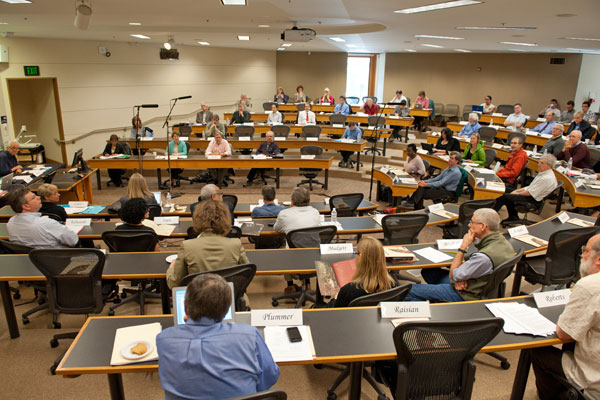Senate approves Ways of Thinking, Ways of Doing breadth requirement
Starting in 2013, Stanford's baccalaureate breadth requirements will be based on a model that promotes the acquisition and development of "essential capacities." The current model prescribes courses in particular disciplines.
Stanford undergraduates will be required to take 11 courses in eight categories to fulfill the university's new Ways of Thinking, Ways of Doing breadth requirements.
The new requirements for a bachelor's degree will be implemented as a result of action taken Thursday by the Faculty Senate.
The senate also voted to create a new governance board to devise the methods through which university courses are placed into the new categories.
Harry Elam, vice provost for undergraduate education, will appoint the board, which will replace the current Subcommittee on General Education Requirements of the Committee on Undergraduate Standards and Policy.
"Where we are going is going to need all of your efforts," Elam said after the vote. "What you just voted on is the beginning, not the end."
After the vote, Provost and Acting President John Etchemendy congratulated the groups involved in considering changes to the university's approach to undergraduate education, including the Study of Undergraduate Education at Stanford (SUES) committee, the Committee on Undergraduate Standards and Policy and the Faculty Senate.
Etchemendy acknowledged that the discussions and debates were sometimes contentious.
"The fact that we disagreed is good," he said. "It's good that we care that much. I think the results are fantastic."
The new requirements are the result of extensive Faculty Senate discussions and debate about recommendations included in the SUES report, which was released in January.
In the 128-page report, SUES members recommended that Stanford move to a nondisciplinary model of breadth requirements that promotes acquisition and development of ways of thinking rather than prescribes courses in particular disciplinary areas.
Starting with the class entering in the fall of 2013, students will be required to complete two courses in aesthetic and interpretive inquiry, two courses in social inquiry, two courses in scientific analysis, one course in formal reasoning, one course in quantitative reasoning, one course in engaging difference, one course in moral and ethical reasoning and one course in creative expression.
Currently, Stanford undergraduates fulfill breadth requirements by taking courses – one each – in engineering and applied sciences, humanities, mathematics, natural sciences and social sciences. In addition, they are required to take two courses in Education for Citizenship, choosing from subjects in ethical reasoning, global community, American cultures and gender studies.
The new breadth requirements are designed to complement other baccalaureate general education requirements, including a foreign language requirement, two courses in writing and rhetoric and a new freshman year Thinking Matters requirement.
As a result of previous action taken at a senate meeting in March, the Thinking Matters requirement begins in the next academic year.
Elam told senate members that his office already has produced a brochure for incoming freshmen outlining more than 35 "incredible" Thinking Matters courses from across the university. The current three-quarter Introduction to the Humanities sequence will no longer be required.
Next up for the senate's consideration of the SUES report recommendations will be revisions to the requirements in writing and rhetoric.
In other senate news, acting senate chair Russell Berman, professor of comparative literature and of German studies, announced the results of recent elections for next year's senate.
Raymond Levitt, professor of civil and environmental engineering and senior fellow at the Woods Institute for the Environment, will chair the 45th Senate and steering committee. David Palumbo-Liu, professor of comparative literature, will serve as vice chair.
Etchemendy also announced that a search committee has been appointed for the athletic director. The committee will be chaired by Robert Simoni, the Donald Kennedy Chair in the School of Humanities and Sciences and Professor of Biology, and Jeff Wachtel, senior assistant to the president.
Athletic Director Bob Bowlsby departs in mid-June to lead the Big 12 Conference.


Share This Story